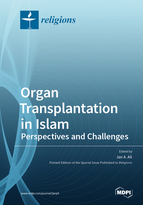Organ Transplantation in Islam: Perspectives and Challenges
A special issue of Religions (ISSN 2077-1444). This special issue belongs to the section "Religions and Health/Psychology/Social Sciences".
Deadline for manuscript submissions: closed (15 July 2021) | Viewed by 26152
Special Issue Editor
Interests: sociology of Islam; sociological theories; theories of social change; sociology of body and embodiment; research methodology; migration and migrant identity; globalisation; multiculturalism; social and religious movements; terrorism; counter-violent extremism; Islamic Revivalism; Muslim communities; Islamic studies; Shari’ah (Islamic Law); Muslim women and piety
Special Issues, Collections and Topics in MDPI journals
Special Issue Information
Dear Colleagues,
Organ transplantation in Islam as a treatment for otherwise fatal end stage organ failure is one of the most under-researched areas in Islamic theology and modern social sciences, namely, anthropology and sociology. This makes the topic rare and the question of how Islam deals with organ transplantation largely under-answered. This is further compounded by the fact that organ transplantation and organ and tissue donation are not specifically discussed in the Islamic scriptures, namely, the Qur’an and Hadiths (record of the traditions and sayings of the Prophet Muhammad). In fact, these two great texts of Islam are silent on the matter.
Given the process of organ transplantation, particularly organ(s) removed from one body and transplanted into another, is a modern medical development born out of new medical and scientific accomplishments, Muslim scholars and jurists are only now beginning to come to grips with the question surrounding organ transplantation and organ and tissue donation in Islam. As such, Muslim scholars and jurists are not necessarily unanimous on the issue. Some consent to the permissibility of organ transplantation and organ and tissue donation, while others consider organ transplantation and donation to be prohibited in Islam, particularly the transplantation of an organ or organs from a cadaveric body into a live body. Then, there are some scholars and jurists who sit somewhere in the middle of these two positions.
Nevertheless, in the current literature on organ transplantation in Islam, scholars and researchers often assert that the majority of Muslim legal scholars have arrived at the conclusion that organ transplantation and organ and tissue donation by living donors and from cadaveric bodies are permitted. The problem with such an assertion is twofold. One is that the literature downplays the significance of the anti-transplantation of organs and organ and tissue donation perspective. Second, the literature does not question the philosophical unpinning and methodological paradigms of Muslim scholars and jurists who support organ transplantation and organ and tissue donation.
An authoritative response to how Islam deals and manages organ transplantation and organ and tissue donation is very much in a formative phase. More robust intellectual and scholarly discussions and debates are needed. Organ transplantation and organ and tissue donation in Islam need to be examined and understood using theological knowledge, legal and jurisprudential principles, and social scientific approaches. This will assist in dispelling many myths and misunderstandings surrounding organ transplantation and organ and tissue donation in Islam.
This Special Issue aims to explore fresh scholarship on the debates regarding organ transplantation and organ and tissue donation in Islam—not only describing the prevailing judgments made by Muslim scholars and jurists on the subject matter but also, and perhaps even more importantly, critiquing them by putting their ontological and epistemological methodologies, theological rationales, and legal and jurisprudential principles under scrutiny. To this end, scholars and researchers are invited to examine organ transplantation and organ and tissue donation in Islam from their respective areas of expertise and disciplinary fields.
The Special Issue invites contributors to consider:
- Islamic perspective on organ transplantation and organ and tissue donation in modern medicine;
- Islamic theological and legal–jurisprudential perspectives on organ transplantation and organ and tissue donation;
- Contemporary Islamic and Muslim issues in organ transplantation and organ and tissue donation;
- Social scientific analyses of organ transplantation and organ and tissue donation in Islam.
Dr. Jan A. Ali
Guest Editor
Manuscript Submission Information
Manuscripts should be submitted online at www.mdpi.com by registering and logging in to this website. Once you are registered, click here to go to the submission form. Manuscripts can be submitted until the deadline. All submissions that pass pre-check are peer-reviewed. Accepted papers will be published continuously in the journal (as soon as accepted) and will be listed together on the special issue website. Research articles, review articles as well as short communications are invited. For planned papers, a title and short abstract (about 100 words) can be sent to the Editorial Office for announcement on this website.
Submitted manuscripts should not have been published previously, nor be under consideration for publication elsewhere (except conference proceedings papers). All manuscripts are thoroughly refereed through a double-blind peer-review process. A guide for authors and other relevant information for submission of manuscripts is available on the Instructions for Authors page. Religions is an international peer-reviewed open access monthly journal published by MDPI.
Please visit the Instructions for Authors page before submitting a manuscript. The Article Processing Charge (APC) for publication in this open access journal is 1800 CHF (Swiss Francs). Submitted papers should be well formatted and use good English. Authors may use MDPI's English editing service prior to publication or during author revisions.
Keywords
- Islam
- Muslim scholars
- Islamic theology
- modern social sciences
- Permissibility and impermissibility
- Organ transplantation
- Organ and tissue donation






